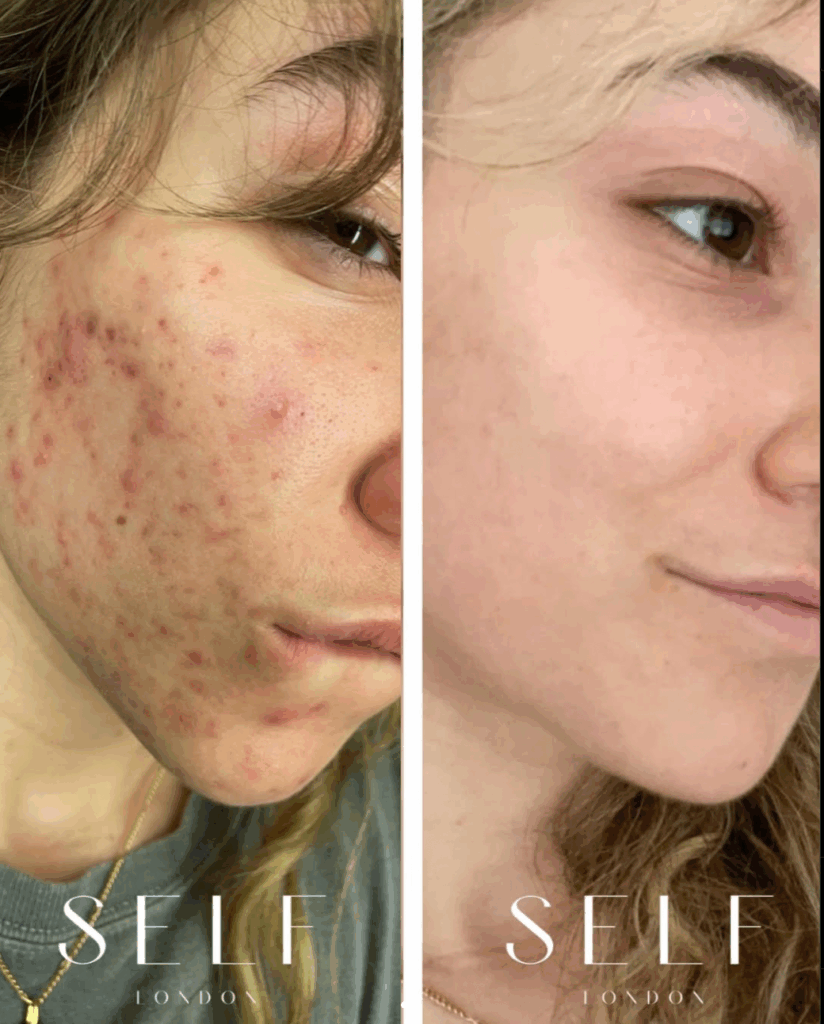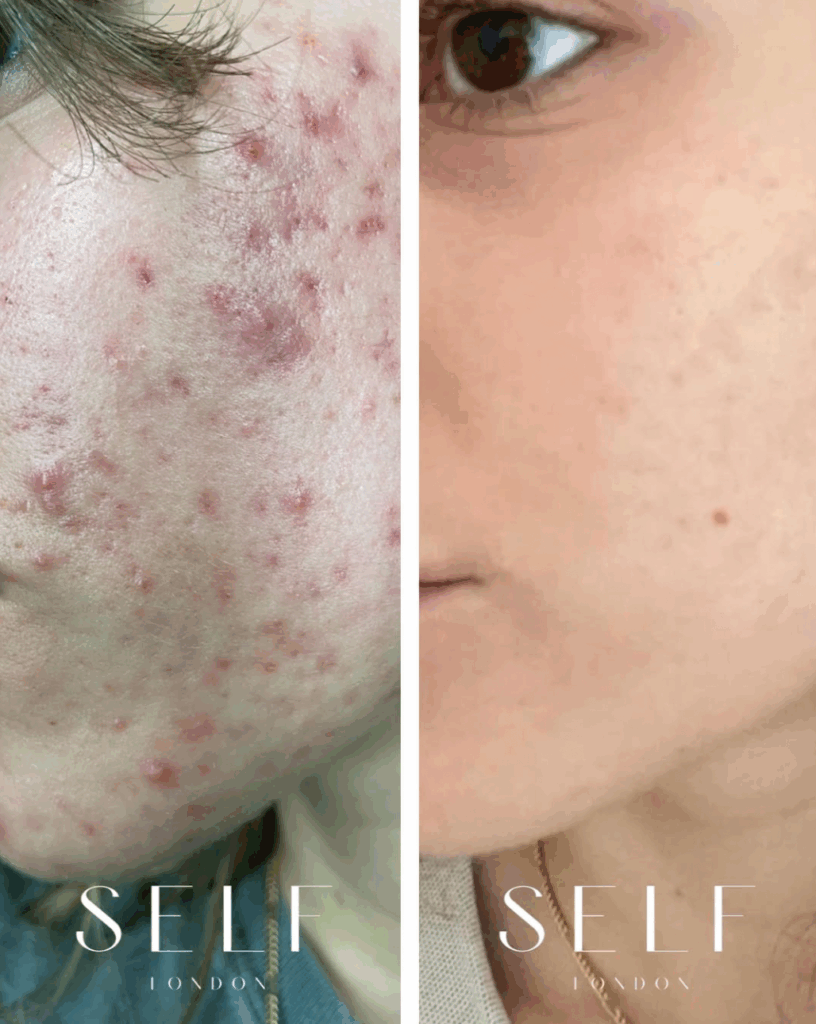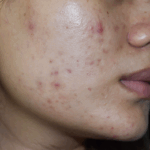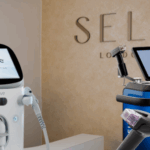
Discover effective acne treatments for teenagers. Self London offers consultant-led care with AviClear laser, skincare, and support to prevent scarring
Acne is one of the most common skin diseases worldwide, affecting up to 85% of teenagers. For many young people it is more than a phase. Breakouts can dominate daily life, lowering self-esteem, interfering with friendships, and leaving marks that persist long after adolescence ends.
For parents, it is often a familiar story: they remember their own teenage years, the scars they carried into adulthood, and the frustration of ineffective creams or long waits for medical treatment. When their child develops acne, the anxiety is two-fold. They want relief for the present but also protection against the long-term consequences they know too well.
At Self London, we believe acne in teenagers deserves the same seriousness as any other medical condition. This guide sets out what acne is, why it happens, what treatments are available, and how families can make informed choices. It explains why device-based treatments such as AviClear are changing the way we manage acne, and why governance, regulation, and expertise matter as much as technology itself.
Why acne starts in the teenage years
Acne most commonly begins during puberty because of hormonal change. Rising levels of androgens stimulate sebaceous glands in the skin to produce more oil. This creates the conditions for blocked pores, bacterial overgrowth, and inflammation.
For some teenagers, this results in occasional spots. For others, particularly those with a family history, acne can become persistent, severe, and scarring. Genetics matter. If one or both parents had significant acne, their children are more likely to inherit overactive sebaceous glands and an inflammatory response that makes them prone to scarring.
Dermatologists emphasise early and effective treatment in adolescence. Uncontrolled acne is not just about temporary breakouts; it is about preventing scars that can last a lifetime.
The impact of teenage acne
The physical symptoms are obvious, but the psychological effects are often greater. Teenagers with acne report higher levels of anxiety, depression, and social withdrawal. They may avoid social events, refuse photographs, or lose confidence at school. Acne is not vanity. It is a condition that affects wellbeing and quality of life.
For teenagers with skin of colour, spots are more likely to leave post-inflammatory hyperpigmentation, visible dark marks that may persist long after inflammation has settled. In some cases, keloid scars may form. This makes timely, safe, and effective treatment especially important.
Conventional acne treatments
The established pathway begins with:
- Topical treatments such as retinoids, benzoyl peroxide, or antibiotic creams. These can be effective but require strict adherence, and irritation is common.
- Oral antibiotics for moderate acne, though resistance is a concern and they are not designed for long-term use.
- Hormonal options such as the oral contraceptive pill or spironolactone, which can be helpful for some girls though side-effects limit their use.
- Isotretinoin (Roaccutane), the most powerful systemic option for severe acne. It is transformative for many but requires careful monitoring and carries risks that understandably worry families.
This leaves a gap for many teenagers: acne that is distressing and resistant to creams, but where families prefer to avoid systemic medication.
AviClear: a new approach to teenage acne
AviClear is the first FDA-cleared laser device developed specifically for acne. It uses a 1726nm wavelength that is absorbed by sebum within sebaceous glands. By selectively heating and reducing these glands, AviClear lowers oil production and addresses one of the fundamental drivers of acne.
Clinical studies show that nearly nine in ten patients achieve at least a 50% reduction in inflammatory lesions six months after treatment, with results continuing to improve by month 12. Data show benefits lasting for more than two years in many patients.
Treatments are usually delivered in three sessions over 12 weeks, each lasting around 30 minutes. The procedure is well tolerated; most describe a sensation of warmth or snapping, and no serious adverse events have been reported.
For families who wish to avoid long courses of antibiotics or isotretinoin, AviClear offers a drug-free, evidence-based alternative that directly targets the source of the problem.
Where skincare fits in
Devices are powerful, but skincare remains a vital part of acne management. At Self London, we combine AviClear with evidence-based skincare that supports the skin barrier, reduces inflammation, and prevents blocked pores.
For some teenagers, this may involve a prescription topical retinoid or benzoyl peroxide; for others, we focus on barrier repair and gentle cleansers. The aim is not to overwhelm with complex routines or sell unnecessary products, but to complement device treatment and maintain results.
Lifestyle considerations
While acne is primarily hormonal and genetic, lifestyle can influence severity. Diets high in refined sugars may aggravate breakouts in some teenagers. Poor sleep and stress can also worsen inflammation. These factors are not causes on their own, but addressing them can support medical and device-based treatments.
The role of parents
Parents play a crucial role in supporting treatment by:
- Taking their child’s concerns seriously and avoiding dismissal
- Encouraging early consultation to prevent permanent scars
- Helping with consistency in skincare and device sessions
- Keeping communication open with the dermatologist to understand timelines and side-effects
Setting realistic expectations
No acne treatment clears the skin overnight.
- Topical treatments may take 8 – 12 weeks before improvements are visible.
- AviClear often reduces oil production first, followed by fewer breakouts over several months.
- Some teenagers may experience flare-ups before improvements settle.
Setting expectations honestly is part of building trust and helps families remain motivated during the process.
Managing scars and pigmentation
Even with treatment, some teenagers may develop scarring or pigmentation. At Self London, we offer approaches including fractional erbium resurfacing, laser coring, biostimulatory injectables, and topical regimens.
Pigmentation and redness can often be improved with carefully selected treatments, while true scarring may require advanced procedures, usually reserved until acne is under control.
Why regulation matters
Treating acne in under-18s is legally a medical activity regulated by the Care Quality Commission (CQC). Not every clinic offering AviClear is licensed to treat children.
At Self London:
- We hold a CQC licence to treat patients from age 13+
- We follow safeguarding policies tailored to under-18s
- All clinicians hold enhanced DBS checks
Parents can be confident that their child’s care is delivered safely and responsibly.
Self London’s experience
We have performed more AviClear treatments than any other UK clinic, giving us the largest dataset and longest follow-up experience.
As a consultant-led dermatology clinic, we design treatment plans around each teenager’s medical history, family background, skin type, psychological wellbeing, and risk of scarring. Long-term support and follow-up ensure results are maintained.
Closing reflection
For a teenager struggling with acne, the condition is not about vanity. It is about confidence, wellbeing, and protection against scars that could last a lifetime. For parents, the decision is about safety, accountability, and choosing a clinic that takes teenage health seriously.
AviClear is a breakthrough in acne care, but technology only matters when delivered responsibly. At Self London, we combine advanced devices, consultant expertise, and governance standards to help teenagers achieve clear, healthy skin in the safest way possible.
Frequently asked questions about teenage acne and AviClear
At what age can teenagers start AviClear treatment?
At Self London, we are licensed by the CQC to treat patients from age 13+, making AviClear a safe option for early intervention.
Is AviClear painful?
Most patients describe the treatment as a warm snapping sensation. It is well tolerated, and sessions last around 30 minutes.
How many AviClear sessions are needed?
The standard protocol is three treatments spaced over 12 weeks. Results continue to improve over the following 6 – 12 months.
Is AviClear safe for darker skin types?
Yes. AviClear is effective across all skin tones, with no reports of pigmentary complications in clinical studies.
Will my teenager still need skincare alongside AviClear?
Yes. We combine AviClear with simple, evidence-based skincare to support the skin barrier and maintain long-term results.
Book a consultation at Self London
Teenage acne can affect confidence, wellbeing, and leave scars that last into adulthood. With AviClear and consultant-led dermatology care, we offer teenagers a safe, drug-free, and effective solution.
Book a consultation with Self London today to explore personalised acne treatment options and help your child achieve clearer, healthier skin.







